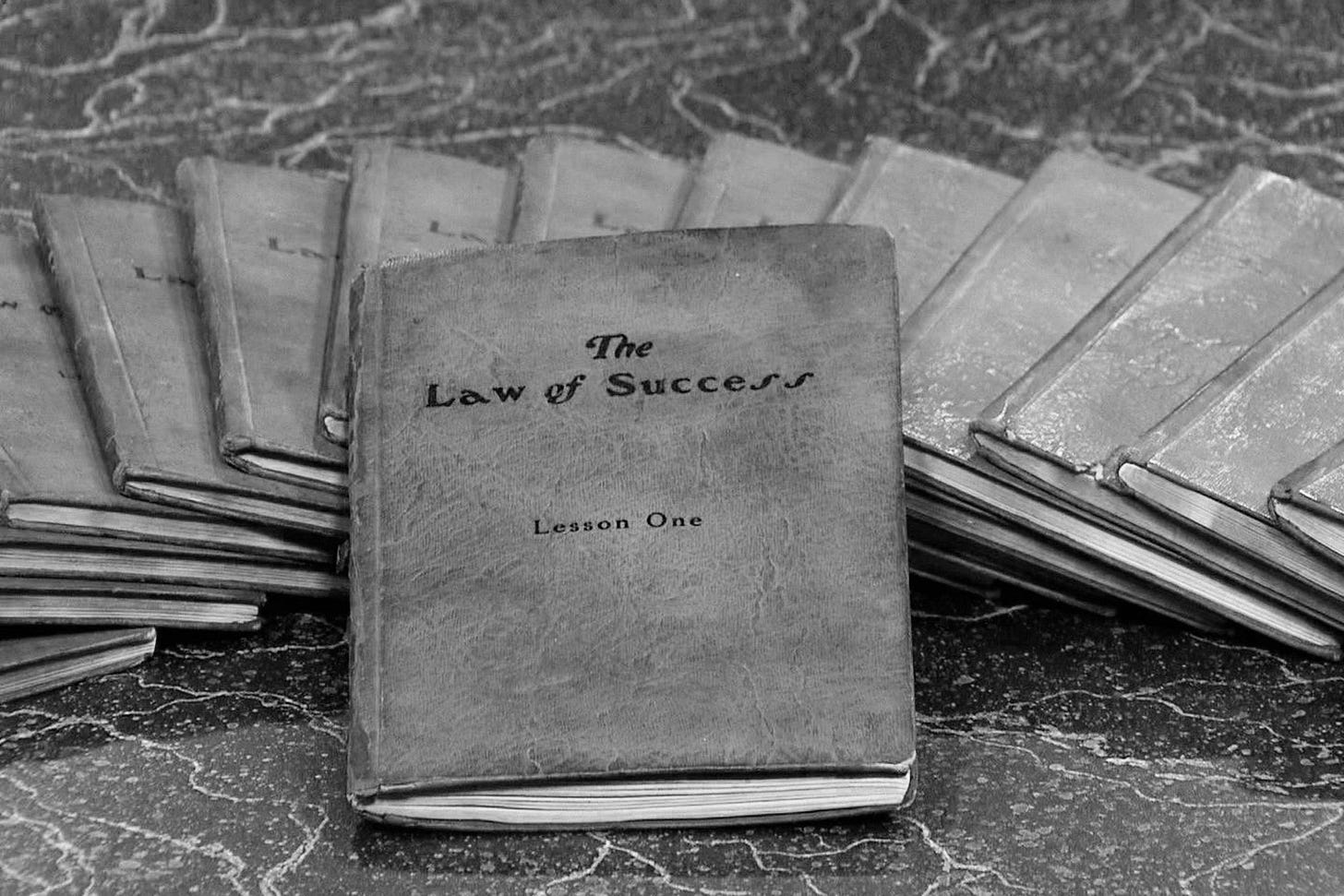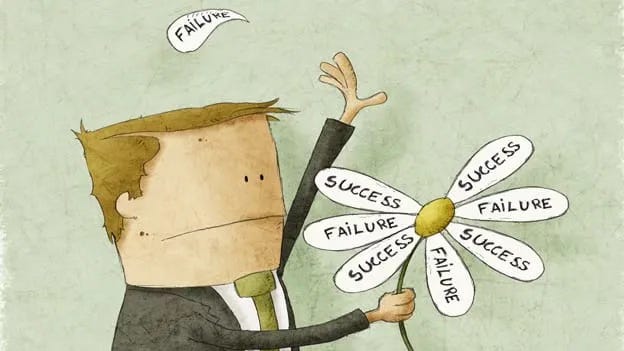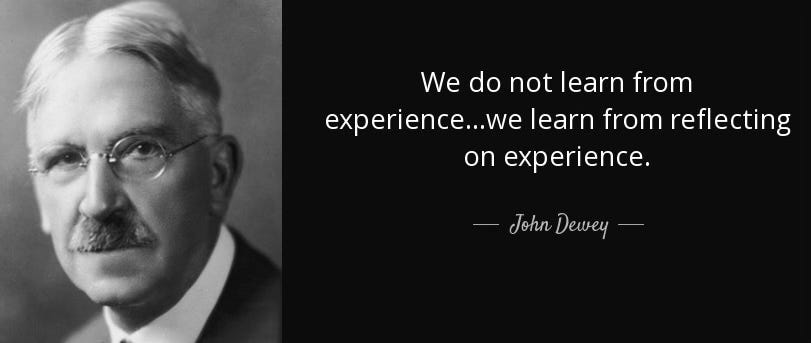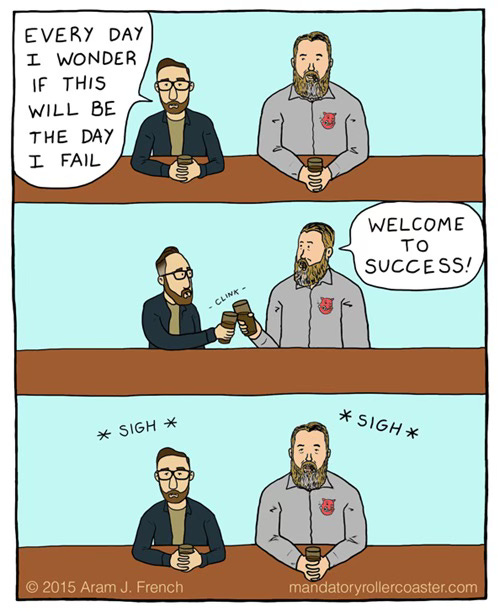I decided to create a section called THE CONTRARIAN a place where unconventional insights confront conventional wisdom.
I reflect on popular phrases and challenge the universal wisdom they claim, because even if there are relative truths to be found in them, I don’t believe in their axiomatic value.
Being a contrarian is not to oppose, but to challenge assumptions, think independently and build an argument from the ground up to avoid conformism.
"I owe my success to having listened respectfully to the very best advice, and then going away and doing the exact opposite."
Welcome to an ad hoc edition of “Students of Leadership.” I am not yet resuming the regular weekly writing, but I couldn’t resist the visit of my alter ego, The Contrarian, who comes today to talk about what he considers a “cliche,” a statement of insignificance; the idea that there is nothing to learn from success, that the only teacher in life is failure.
Who decided to create such absolute? Why? Where is the proof? What does it really mean?
Does success only reveal itself after a tortuous path paved by an incalculable number of failures? Is failure the only teacher in the house?
Needless to say that setbacks turned into lessons are critical parts of our journey, the growth-currency of life. It’s moments of failure what often act as stepping stones into the future.
However, it’s the idea that you can ONLY learn from failure, that there is NOTHING to learn from success what makes no sense.
So, where do teachings come from?
We learn neither from failure nor from success per se, they don’t have intrinsic teaching capabilities; It’s only what comes out of failure or out of success what has transformational potential. The real teacher is the one within.
This inner teacher requires three elements to reveal itself and turn everything that comes our way into character building experiences and into meaningful life lessons:
1. Learner mindset, 2. Strategic thinking, and 3. Humble paranoia
For example, a good amount of failures without self-awareness or strategic thinking to ask good questions, connect the dots and identify patterns of behaviors and outcomes, will have very limited teaching potential. On the other hand, a successful experience paired with intellectual humility to avoid the Hubris born of success and clarity of thought to see through and identify what could still be missing, will turn you into a world-class student.
We owe it to ourselves the understanding of events for what they really are, not for what stereotypically they are supposed to be.
A failure is a failure, period, it can be small and temporary or big and long-lasting, but it’s a failure, not a teacher. A success represents a great step forward, period. It can be major and transformational, or small and short-lived, but it’s not a non-teacher.
Failing at something, having significant setbacks, missing the mark… are exactly that, they are not successes in disguise. They can have the kernel of future successes, but today they are a failure. No euphemisms please! By the same token, succeeding at something is hitting the mark, delivering on time, creating a new standard, setting a benchmark, closing a desired deal, creating high impact, having a family we love. None of those things have less teaching potential than a string of well orchestrated failures.
Most life events are not permanent, nor they are final, thus pausing in failure to recover and think; as well as remaining humble in success to plan for next steps, are both very good teachers, but only if your mind and your emotions are in the right place.
We only learn if we learn how to learn, not matter the experience.
I recently listened to a very short clip from an interview with George Clooney where he boldly says “You learn nothing from success.” (You can listen to it below)
George Clooney "You learn nothing from success"
He goes on to say “(…) never, there is nothing you learn from success, you learn everything from failing. Fear of failing is what holds people from doing anything, and when you don’t try and wake up at 65 year you are a lot angrier than if you failed. It’s a lot easier to be 65 and say: I tried to do that, and I just couldn’t do it. I think you would be really mad if you say I think I could have done that but I didn’t try.”
What is this? A salad of statements. There are at least 2-3 different ideas interconnected as if they were one, and that is a problem.
One thing is to say ‘You learn nothing from success’, you learn everything from failure. Agree or disagree, but that is one idea!
Another thing is to talk about ‘Fear of failure’ as if it is what holds people back to do the things they should have tried otherwise, implying that this is what ultimately leads to regrets. Agree or disagree but this is now a different idea.
I can see a potential thread in the underlying concept that if failure is the great teacher, you should not fear failing by avoid doing things that will in turn lead to regrets, because you learn by failing, which over time will lead you to live a happy life, with no regrets…
But as a contrarian, there are flaws here. Let me explain
“You learn nothing from success, you only learn from failure?” Not true. You learn from failure and you learn from success, if you know how to learn, if you are predisposed to learning.
“Fear of failure as a reason for not trying?” Maybe true, but it is not the only reason for not taking risks in life. But what concerns me most about this idea is the similarity with what is called “survivorship bias,” where all failures that indeed led to catastrophe are not even contemplated. That’s why it’s very common to hear this type of advice only from successful people.
“We often overlook the ‘silent evidence’ of history’s losers”
“Regrets for not having tried something when you would have wanted to?” Yes, most likely true. If you really wanted to do something but you didn’t do it, at the end you may have regrets, of course.
Now, see the problem with this type of logic?
You start with something that is false presented as a truth (1), then you move on to something that may be true in support of your initial point (2), to then finish with something that is an obvious true (3) to close the argument feeling that it’s all connected, hence all true.
What can I tell you?
Mindset as a teacher
Roger Federer recently shared the statistics of his career in a great commencement speech at Dartmouth College. He said that he only won 54% of all points he ever played! He lost 46% of points. This means that someone like Federer practically lost every other point he played. Think about that for a minute.
But here the lesson is different, it is a great example of how important having the right MINDSET and being RESILIENT are. When you miss a shot (fail) with such high frequency, if you want to be good, you need to learn to move fast from one mental state to the next, not to dwell on every miss; reinforce with positive talk, “it’s just one point, now comes the next.” You have to sail through it, and the exact same logic has to apply to every point won, even to a great shot. No matter how incredible the win, in the big scheme of things it was just one point, just another shot floating in a sea of statistics where the next will likely be a miss. A delicate balance between high confidence when you miss and humility when you win.
What does this reflection by Roger Federer have to do with the idea that “You learn nothing from success?”
Federer goes on saying:
“When you play a point, it has to be the most important thing in the world but when it is behind, it has to be behind you. This mindset is really crucial because it frees you to fully commit to the next point and the next point after that, with intensity, clarity and focus.
Do you really think he did not grow with every success? Do you really think that his confidence did not grow exponentially by knowing what he was really capable of? Do you think that his technical abilities did not get better after the repeated precision of his exquisite backhand?
Success requires a mindset capable of taming the mind to harness the inner creative and resilient self. The person that does not pay attention to this, whose mind is untrained, ends up being filled with negative talk, self-sabotage and excuses as to why things can’t happen. This leads to lack of motivation and an overall negative outlook on life.
“Why you may learn less from failure than success”
I recommend you listen to this 6 minutes clip by Ayelet Fishbach on “Why we fail to learn from failure”
“Chicago Booth research examines how mistakes can make people ‘tune out’
“Failure may not be the great teacher that conventional wisdom says it is. New research from the University of Chicago Booth School of Business finds that, contrary to common belief, people learn less from failure than from success.
“Our society celebrates failure as a teachable moment,” write the study’s authors, Prof. Ayelet Fishbach and postdoctoral fellow Lauren Eskreis-Winkler, who found in a series of experiments that “failure did the opposite: It undermined learning.” Their research is forthcoming in the journal Psychological Science.
“We are taught to learn from failure, to celebrate failure, to fail forward,” said Fishbach, a renowned expert on motivation and decision making. “Graduation speeches often talk about how much you should dare to fail and learn from your failures. And managers talk about the lessons that they personally had from failures. If you just listen to public speaking, you would think that we are pretty tuned in to failures. However, this is not the case.”
“If you just listen to public speaking, you would think that we are pretty tuned in to failures. However, this is not the case.” —Prof. Ayelet Fishbach
Finally, what can you really learn from success?
A lot, just to name a few that come to mind…
Bias to action
Success is determined by the ability to move forward in life. What stops people from succeeding is not fear of failure, it is the inability to take action, the incapacity to get started! Success reinforces the importance to have a strong bias to action.
Not your cheerleaders
People you think are by your side will not always be the ones that will support you or have your best interest. This is not about envy or mean spirits, but mostly due to the lack of understanding that success creates unstoppable momentum, which drives constant change and adaptation. Many people will not know how to keep up with that pace.
There is a price
I don’t mean a price to pay to reach a destination, but a higher price to pay to operate at the new level, to be effective inside this new space. There’s a price of time, of choices, of stress, of forced trade-offs. Success will demand more of you, not less. Are you capable and willing to pay the price? This is a huge lesson that only success can teach.
Success breeds more success
Unless you succumb to Hubris, with success more doors will open, you will gain more clarity, you will gain more influence, more people will become part of your network, more ears will listen to what you have to say and more hands will bring you opportunities to consider. That will teach you something huge, that success is not linear, it’s exponential.
The execution is the strategy, the strategy is execution
When you succeed you realize that the division created in your student notes between strategy and execution is far less real than you thought. We said that success is the ability to move forward, to generate positive momentum, that the real problem is with inaction; so any successful person, no matter how good of a strategist they are, will have to become an execution machine to lead efficiently.
You can succeed and still be a failure
This is the biggest one of all. Let that sink in.
Don‘t be fooled, the opposite to success is not failure, it’s inaction!
Conclusion
While failure undoubtedly provides valuable lessons, we can’t overlook the wealth of knowledge hidden within success.
Success teaches us confidence in our abilities, validation of the path chosen, affirmation of how effective strategies play out, and the most important lesson of all, that with each move higher, you need to become a better version of who you are.
When you fail you need to keep trying so you can grow. When you succeed you need to keep growing so you can keep pace.
Failure teaches tenacity and grit. Success teaches humility. Like it or not, you are most likely not good enough for what comes next.
People love to think that exaggerated positive self-talk will do miracles “you are marvelous the way you are, you are good enough.” Well, I’m sorry, but when you are on the quest for excellence, the first truth to digest is that you surely are not amazing just the way you are, and almost certainly you are not good enough to tackle what’s coming at you. Introspection and growth are the answers.
Are you up to the challenge?
P.S. Before I go, here you have “The Treat,” where I share some of the music that kept me company while writing … Enjoy as you bid farewell to this post
“Lead yourself, Learn to live. Lead others, Learn to Build.”
If you enjoyed reading this post consider subscribing to the newsletter for free, joining the community and sharing your thoughts.












Excellent ~